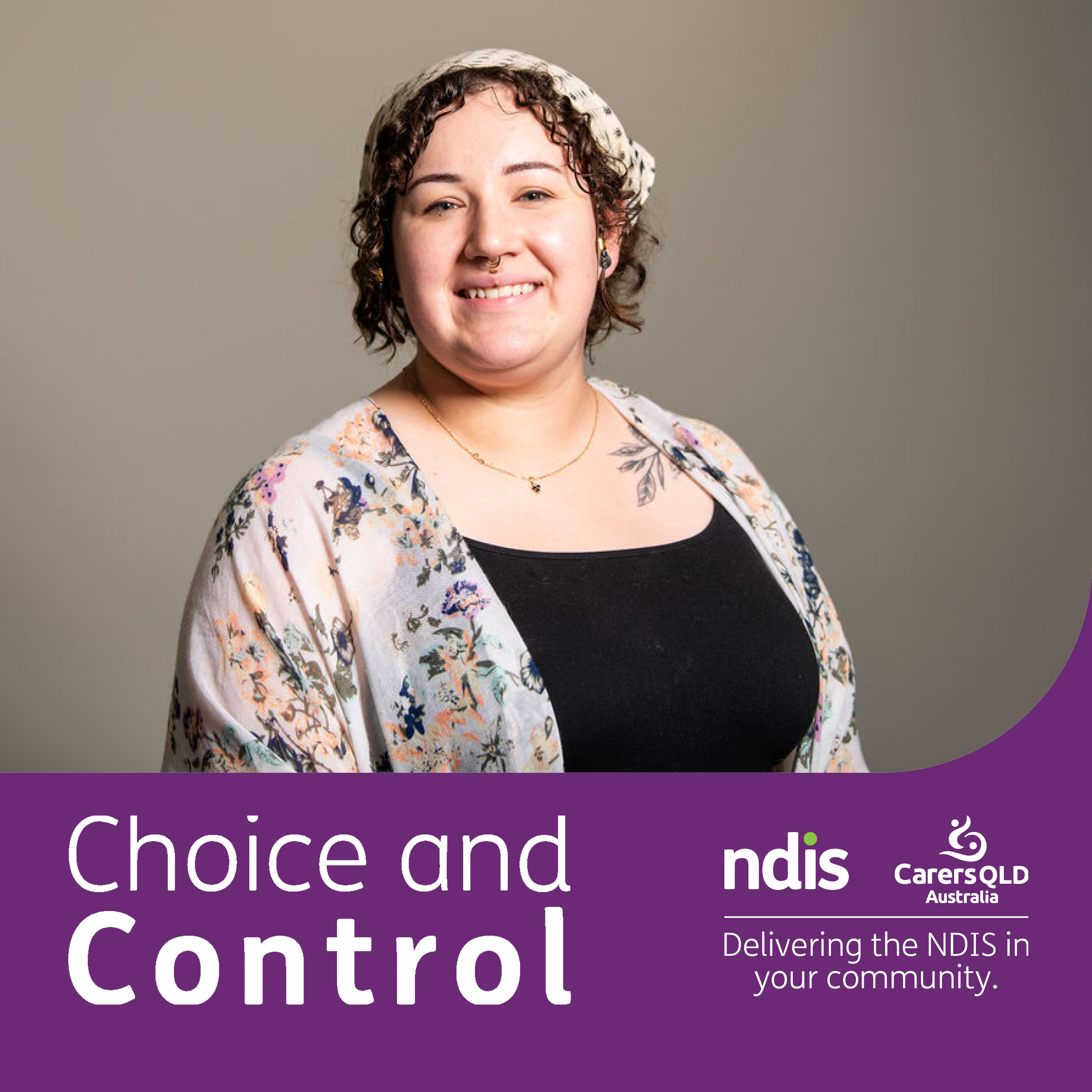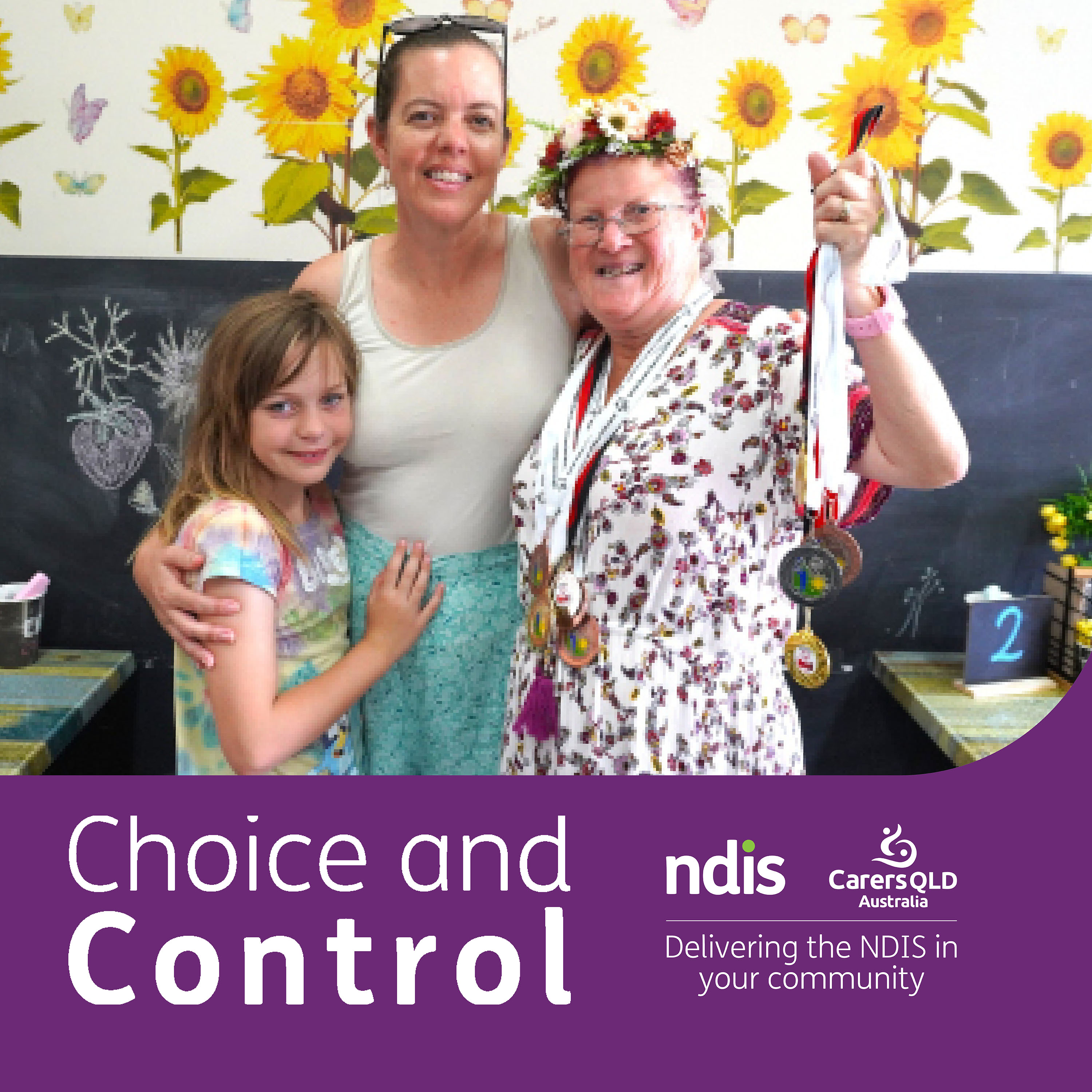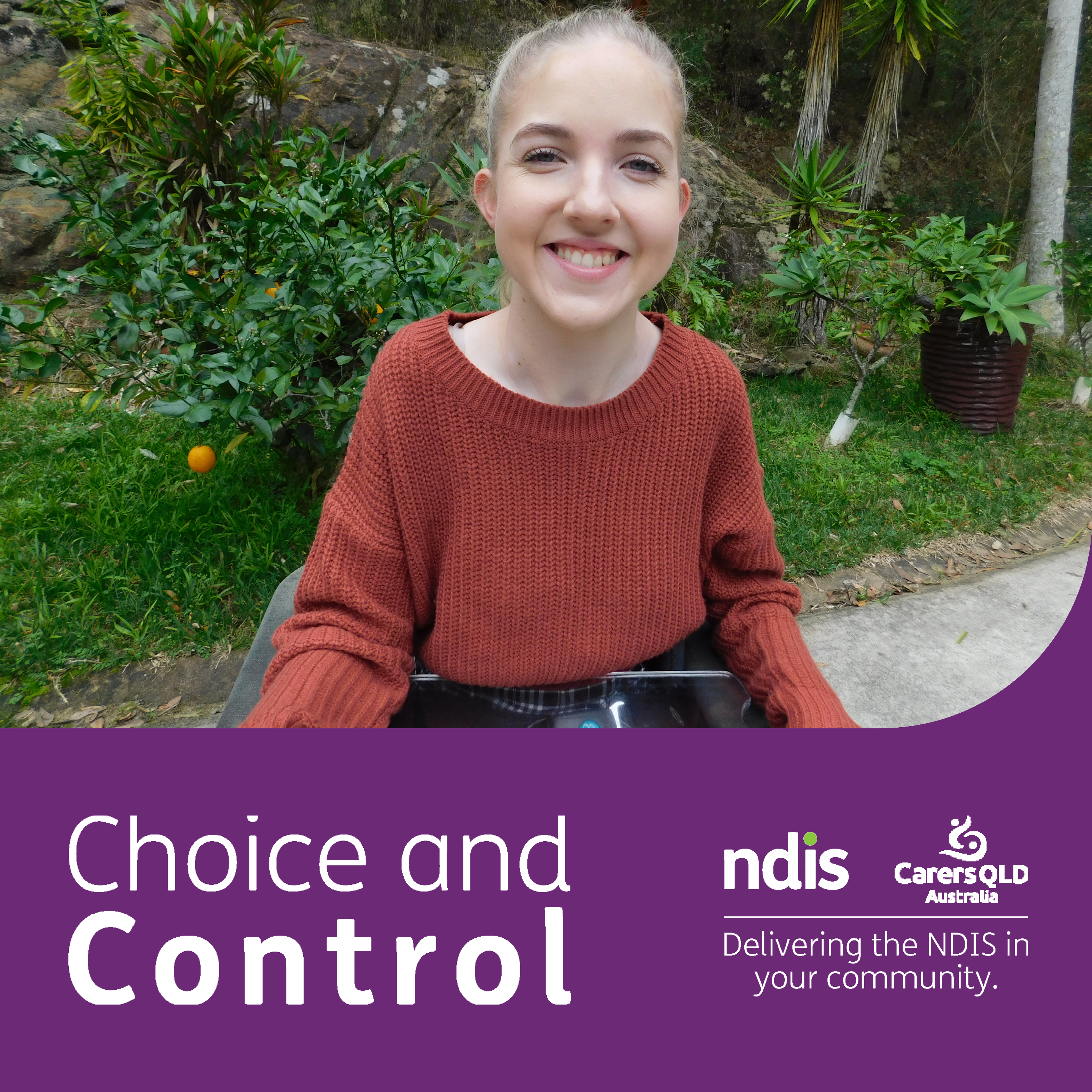Speaker 0 00:00:00 LA Connect. It's a new way to stay in touch with your local area coordinator, Carers Queensland, with everything you need right here on your device. It's a handy app to keep track of your LA appointments, browse workshops and events, check out information and support, and get the latest news stories and podcasts. It's available on Android and iOS, so whatever device you have, you can stay in touch. Head to our website to sign
[email protected] and look for LA Connect
Speaker 0 00:00:38 Joyce and control a podcast celebrating people with disability. Brought to you by carers Queensland, N D I s, local area coordination partner in the community. Carers week. Every October is a chance to celebrate the amazing contribution made by 2.65 million unpaid carers in Australia. This year is the 30th anniversary of Carers Week and Carers Queensland have been celebrating with events right across the state. What better time to have a conversation about what a carer is, the contribution they make, not only to their families and their loved ones, but to the entire community and the economy and where do we go from here? So we sat down for a chat with the CEO of Carers Queensland. Deborah Cultural
Speaker 2 00:01:22 Carers do an amazing job of providing additional support to people that they love and that's really why they do what they do. But it's definite that if carers weren't there to support those people that they love, who may be frail age, they may have a disability, they may have a chronic illness, they may have mental health illness. If their family members and their friends weren't there to support them, then all of that care would need to be paid by our governments. Um, and so they not only do an incredible job of doing that, but they also are propping up our economy basically.
Speaker 0 00:01:57 And if all the work being done by unpaid carers had to be done by paid staff, you'd be looking at tens of thousands of people you'd have to add to the workforce.
Speaker 2 00:02:06 And we already know the shortages that are being experienced in, uh, our disability services sector as well as our age care sector. So it would look pretty grim.
Speaker 0 00:02:14 So where does Carers Queensland fit in as the organization supporting the carers?
Speaker 2 00:02:19 Carers, Queensland's been around for about 32 years now. Uh, we've had a long history of working within our community to support both carers and the people that carers support. Uh, so it's really valuable for us to honor both people in the relationships because relationships and families don't stand alone. Um, and everybody needs some support at some stage. So it's been a great honor and privilege for me to see this organization grow, supporting carers, supporting people with disability and being able to do those, both those things hand in hand
Speaker 0 00:02:53 Because the two are so connected, What supports the person with disability will support the carer as well.
Speaker 2 00:03:00 It is a very connected system and I think that's why um, when the board took a very considered approach before we went into, um, undertaking our first tender for our national disability insurance scheme, l a partner in the community, because it really did fit with our vision and mission, um, that one of the best things that we can do support car is to support the persons that they care for. So it does fit very well with the values of Carers Queensland.
Speaker 0 00:03:28 Now we have some statistics here of carers who Carers Queensland have worked with in the last year or so, and one that leaps out straight away is that caring is still very much a female role.
Speaker 2 00:03:40 Yeah, and I think that's very true and will continue to be true. Uh, and particularly for carers, what we call sandwich carers who may be looking after a child with a disability, but also have frail aged parents that they're looking after. And a lot of that work predominantly falls, uh, on our females.
Speaker 0 00:03:56 And having a look at the age breakdown, some of the carers who carers Queensland works with are very young. They're still children themselves.
Speaker 2 00:04:04 Yes. And young carers a a group that we support quite regularly and particularly up here in Rockhampton through our, It's All About Me program that helps build resilience in young carers and those young carers that we, uh, support or even younger than the stat that's down there because the ones we predominantly supported between the ages of five and 12. Um, but a young carer can be termed a young carer right up to the age of 25 and they can be a sibling carer for a sibling who has a disability or a chronic illness, or they could be also seen as a carer for mom or dad who may have a mental health illness. The work that we do with young carers, it's really great to help them to build that resilience, but also where they get to meet other young carers and know they're not alone and they're not that different. Cuz we all remember growing up. The last thing we wanna do is stand out. So often young carers don't tell people at their school or their friends, um, or their teachers that they are a young carer. So it's great for them to get with other kids who know those extra things that they're doing.
Speaker 0 00:05:03 Carers Queensland's work has changed a lot over the years, particularly the last five or six years as the N D I S has rolled out in Queensland. And we've stepped into that role as the local area coordinator,
Speaker 2 00:05:15 Our registered training organization, our carers program, uh, the advocacy work we do, uh, research poli policy work that we do. Our LAC partner in the community program are all well and truly now embedded, uh, across our whole organization.
Speaker 0 00:05:32 One of the branches of Carers Queensland's work these days is as a registered training organizations supporting carers and others to build new skills and get back into the workforce.
Speaker 2 00:05:43 At the moment, we've got, um, a skill in Queenslanders for Work grant that's particularly aimed at women who want to get back in the workforce. It's not just the training that's provided, there's other supports provided by that. So, uh, jump on our website or give our RTO a ring if you're interested, because we'd really like to, um, support more people who want to return to the workforce being able to do that. Uh, our focus for RTO is not just on unpaid family and friend carers, but what we wanna be as an RTO that supports the community care sector. So we, we broaden our, our our range, but certainly we are there to support carers to get back in the workforce if they so choose.
Speaker 0 00:06:23 So this is potentially something that would come in handy for the sandwich generation you were talking about before, people who have been supporting kids with disability, supporting, uh, parents as they're aging and maybe you've had a break out of the workforce for a couple of years and now you're looking to build your skills up before you get back in.
Speaker 2 00:06:40 Absolutely. And I said it's, as I said, it's not just the training you'll get supported with, uh, at no cost. There's some other supports that are available too because we know that, as you say, for many carers that have been outta the workforce for quite some time and there's a range of support they need to grow their confidence and their skills to get back into the workforce. And we're here to do that.
Speaker 0 00:07:01 Queensland has more than 530,000 carers. It works out at about one in 10 people, and many of those may not realize they are a carer. One of those 530,000 is Susan Peters from the Grath Belt.
Speaker 3 00:07:16 I care for my two children, my adult children, and, uh, they're 22 and 20. Amy was diagnosed with autism at 19, so she was quite a late diagnosis and I began sort of caring quite, uh, intensely for her during that time. My other daughter, Leah, she is 20 now and she, uh, is in the last little bits been diagnosed with, uh, bipolar, um, O C D, um, generalized anxiety disorder, panic disorder, binge eating disorder. And I reckon that's about it. So I care for those two for them. Um, at the moment, um, Amy's doing really well, so that's great. Leah, in a very acute, um, time where she needs a lot of care. And, um, at the same time, I'm married to Dar my husband of years and we have our own business and he's a counselor, so we're constantly in the mental health area
Speaker 0 00:08:12 Because that business is, uh, mental health related too. Is that right?
Speaker 3 00:08:16 So he's a counselor and therapist and he primarily looks after, um, people and kids who are on the spectrum. So you, we were both quite surprised when Amy received her diagnosis of autism that we hadn't picked it up earlier. And at the same time we went, Oh yeah, no, that makes sense now. So girls are really good at masking their autism. Uh, they learned to copy, uh, the behaviors with other people around them as Amy did. And so we sort of, we basically missed it, but she was having so many difficulties. But once we finally got that diagnosis, we were like, Yeah, no, this makes sense. So,
Speaker 0 00:08:50 And having that background, once you did have the diagnosis, do you think that gave you some skills to, uh, to put into action straightaway?
Speaker 3 00:08:57 It did actually. Yeah. We were straightaway able to start. Uh, he was doing some therapies with her and we also sort of knew the path to follow as far as finding those extra helps as well. Um, through, well, once we had the N D I S sorted, then we were able to get help through OTs and support workers and various other people.
Speaker 0 00:09:17 You mentioned the support that's available for your daughter. What about support for you as, as a carer? What's out there?
Speaker 3 00:09:25 There is help out there for carers, but you have to sort of know where to look. Um, and that's why, um, the more we talk about carers, the better it is. It helps them to bring them outta doing these roles where they don't get any help, um, to finding a community of people who can also encourage them, bring them along. So for me, uh, I connected with another lady and she was caring for her husband and she then put me in touch with the carers Queensland group and well, we now have a group that meets every fortnight and, uh, we're just a gathering of people who are carers, um, and with our carers coach and, uh, she, we just sort of get to know each other, share ideas, help each other, encourage each other, and it just sort of helps keep you going to the next two weeks
Speaker 0 00:10:12 As much as there is the practical side of sharing tips and sharing resources. Also just the solidarity of knowing that other people are going through the same thing.
Speaker 3 00:10:20 Yeah, I mean, sometimes you think you're the only one who's doing what you're doing and to find out there's other people. Yeah, I've been there, I've walked that road as well. It does give you some kinda encouragement to keep going. You can look at them and say, Oh, well look how well they're doing now. Or Look, they've had this experience and I can follow in their footsteps or whatever might be, uh, the case. It's that, um, coming together uh, gives us an opportunity to share and to encourage one another and move, move forward together. Yeah.
Speaker 0 00:10:49 And how do you juggle caring commitments, running a business, keeping a, a household running? How do you keep it all together?
Speaker 3 00:10:59 I would say not well, uh, <laugh> today is one of those days. Um, I have to be prepared, uh, to drop everything at the last minute. If the needs of my daughter are particularly that day, I just have to dump everything and I have to be there for her. So every plan I make, it's always done knowing that I may have to drop all this. Cause I never know when she's gonna have a good day or a bad day. So <laugh> today I've been running backwards and forwards trying to do all the business admin and, you know, collect and things like that. And then I come and I've gotta run it to the doctors'. She's not well. And then, you know, uh, I still haven't done those dishes from breakfast and, and it's raining, so the washings on the line, but it's getting wetter and wetter or we, yeah, I constantly feel like I'm failing at everything, but at the token, none of that stuff really matters. End of the day my daughter's been, and I've looked after her and she feels content.
Speaker 0 00:11:55 Do you think it's given you a, a bit more perspective on what's really important?
Speaker 3 00:11:58 I think it has, and at the same time, I think I do have to challenge myself to remember what's really important. I'm a organized, I like things very organized, and I can get really upset if the spikes aren't put back in the same alphabetical order that I like to have them. So on occasion, I do have to remind myself that's not really the biggest deal out there. Um, so I do have to constantly just prioritize. Okay, what's most important is my relationship with my children and me as their carer being their best as much as I can as well. So I kinda see that as my vocation. Now.
Speaker 0 00:12:35 What would you like the mainstream committee people who haven't had any real experience with this caring role, What would you like people to know about caring and carers?
Speaker 3 00:12:45 I'd like people to know that it really is 27 for the most of us is unpaid and it never ends, and it's just not easy. So we can't just drop things and come to your event or go to the movies or find out time for self-care and things like that. It's just, it's just not that easy and everybody's circumstances are incredibly complicated. So just giving those bits of one-off advice, Oh, you should just do this or you should just do that. It doesn't really work. Everyone's situation can be very complicated. So I would think the best way you can help somebody with who is a carer, uh, give them a meal to be frank, um, they have to cook that night. That makes a huge difference. Um, maybe a phone call or text to say, Appreciate what you're doing and you're doing it well. And just yeah, offering that sort of help, uh, practical help can be, can mean the most.
Speaker 0 00:13:35 If you'd like to find out more about Carers Week support available for carers or maybe hook into that free training, you can find more information about all of that on our website, carers qld.com.au. Thanks for joining us at Choice and Control, a Carers Queensland podcast. For more information about the National Disability Insurance Scheme or carers Queensland, contact us
[email protected]. You can call us on one 300 triple 9 6 3 6 or head to Facebook and look for carers Queensland N D I S.


